At long last, Portland appears to have broken through its automated enforcement camera logjam.
On Thursday, just as we teased out back in March, the Portland Bureau of Transportation announced that 11 new cameras are currently in operation since we last checked in on this issue and that eight more will be issuing citations by the end of this year. And that’s not all: at least 12 more cameras will come online in 2024.
“With more traffic enforcement, we can send a strong signal that the reckless driving we’ve all seen in recent years is unacceptable in Portland,” said the city commissioner in charge of PBOT, Mingus Mapps, in a statement.
PBOT is installing two types of cameras: one that snaps photos and sends citations to folks driving well over the speed limit (typically the threshold is 11 mph over), and another used at intersections that enforces both speed and traffic signal compliance.
Despite the widespread public and political support for cameras as a safety tool, Portland’s implementation of them has lagged. As of our story back in March, PBOT had only installed nine cameras at five locations since 2016. Officials have blamed everything from contractor and supplier issues, to design problems, vandalism, and electrical challenges for the delay.
Commissioner Mapps has been a very strong supporter of cameras and promised to double the number of cameras in an interview with BikePortland earlier this year. It looks like he’ll meet that goal. “In total, the city will soon operate 40 safety cameras throughout Portland,” PBOT said in a statement yesterday.
PBOT has also released an updated map (above) that shows the locations of all current and future cameras. See the list of new and upcoming locations below:
Many Portlanders are reasonably concerned that the rise of obscured and/or nonexistent license plates on cars might decrease some of the effectiveness of these cameras. I posed a question about this issue to PBOT.
“The cameras do have limits and your question raises the importance of continued enforcement with trained staff,” Rivera said (note that Portland can now use non-police staff to review citations and is currently staffing up to do that). “There’s really not much that cameras can do to address multiple violations.”
Rivera added that these cameras are just one tool the city uses to slow people down and reduce dangerous driving behaviors. ” We are also partnering with Portland Police, educating people about the impact of speed, and changing street designs to reduce vehicle speeds,” he said.
And what about those folks who try to hide from cameras? Rivera says they’ll use PBOT’s parking enforcement officers to catch those folks.
Learn more about PBOT’s enforcement camera program on their website.



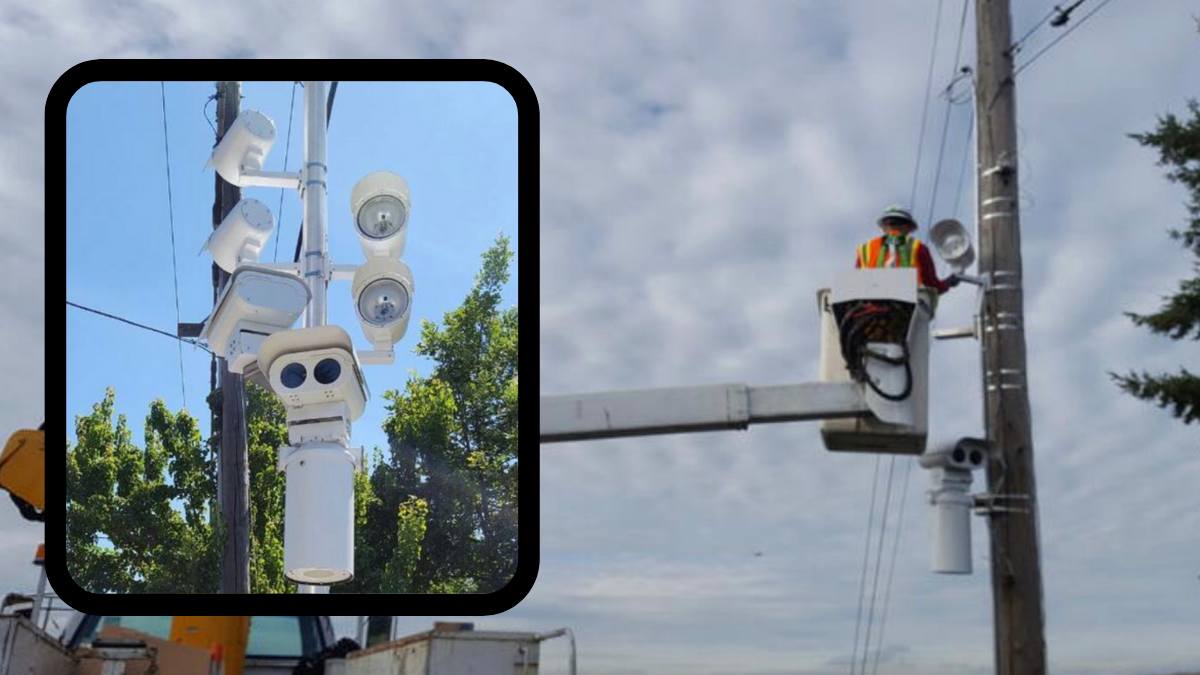
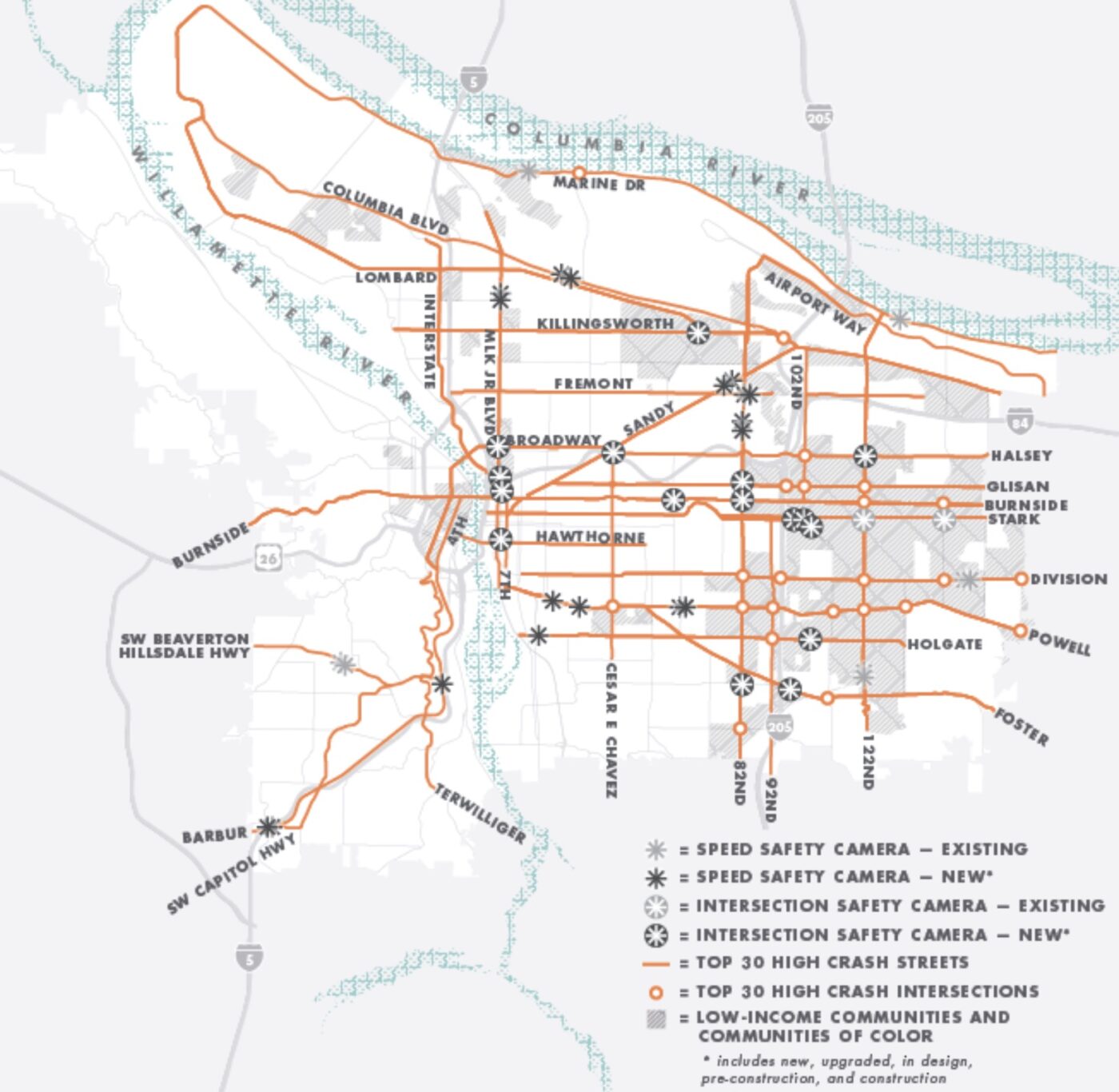
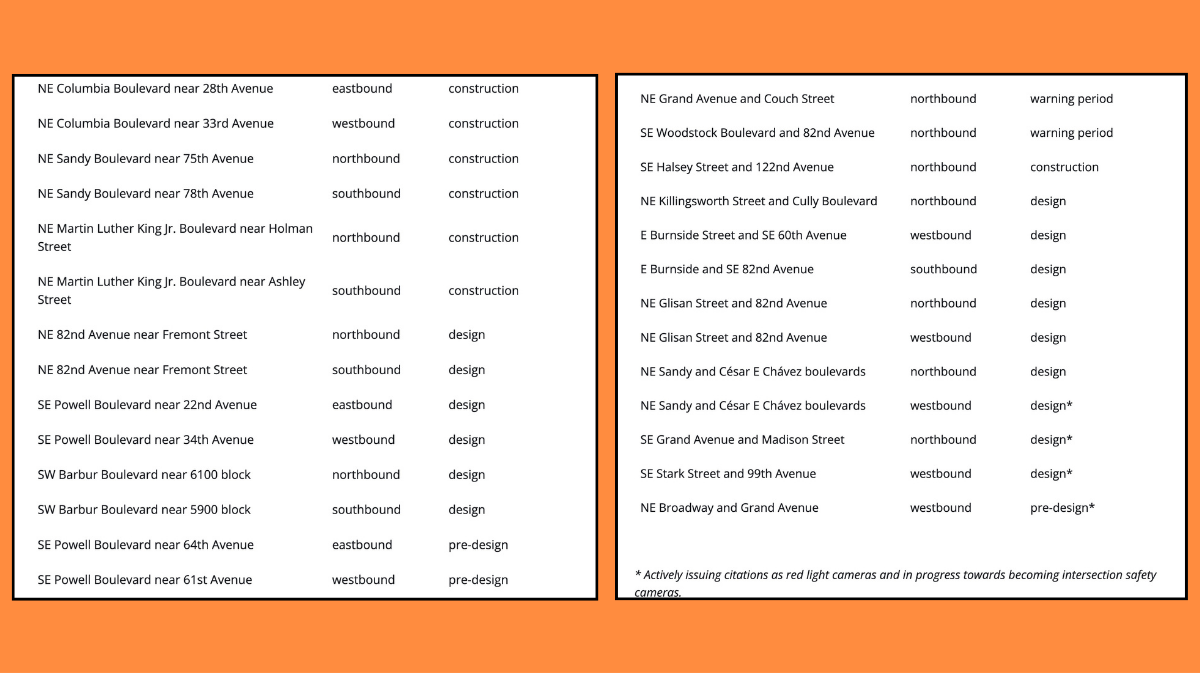
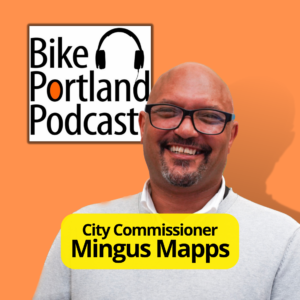
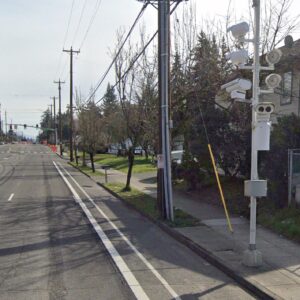

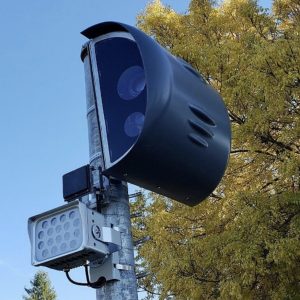
Thanks for reading.
BikePortland has served this community with independent community journalism since 2005. We rely on subscriptions from readers like you to survive. Your financial support is vital in keeping this valuable resource alive and well.
Please subscribe today to strengthen and expand our work.
So glad to hear this news!!! And the locations along Powell are *chefs kiss*
Love to see this. I ride by the BH Hwy speed camera often and most people will go under the speed limit through the camera section. Every once in a while I’ll see someone without plates go fast through the area but it’s uncommon enough that these speed cameras are still effective.
This is insane. These speed readers are really accurate and are never a single mph off compared to my bike’s speedometer or the gps speed on my phone. The difference between 10mph is the matter of life and death in a collision.
I think the law is 11 over and that’s why they’ve chosen that number.
The law is that one mile per hour over the posted speed is a violation!
One to ten is a class c violation. Eleven to twenty is a class b violation. Twenty plus is a class a violation.
The law for camera enforcement is that tickets are only given for going 11 mph above or over. That’s the law, push to change it if you don’t like it.
What law are you citing? Everything I see in Oregon law suggests to me that photo radar cameras can be used to enforce any speed limit that complies with state regulations. I see a document published by ODOT that states that red light cameras can only enforce speeding of 11 over or greater. But that document says nothing about other photo radar enforcement in other locations.
Yeah, here we go, ORS 810.437 (1) (f) says that red light cameras can only enforce speeding that is greater than 11 mph above the speed limit. Also, 810.434 says that enforcement starts at >11mph above speed limit. But both of those laws have “photo red light” in the title, which suggests to me that these only pertain to traffic enforcement devices mounted at intersections for the purpose of traffic light compliance.
Most of these are red-light and speed combo cameras, so they would be subject to that statute. That’s what I was referring to. Perhaps you’re right that speed-only cameras can enforce any speed limit infraction, but the idea that there would be different rules for one than the other seems legally dubious. Any driver could easily challenge in court, saying that having different rules for different cameras is confusing and designed to trick people. As someone else mentioned, the courts also don’t like using a lower threshold because they just end up losing the cases more often. People can just claim their speedometer was faulty, or they were just keeping pace with the rest of traffic, or whatever. Unfortunately we have this culture that 5 mph over is totally the norm, and only 10 mph over or more is considered egregious. Until we change that, trying to issue tickets for less than 10mph over is not going to work.
11 over is what the courts support. There are ridiculous arguments about the accuracy of speedometers and fear of public outcry if they went lower. The other thing is courts are so backed up that they want to only see egregious problems. Sucks.
Yeah an 11mph margin is so huge that yeah it’ll catch the maniac drivers that still have license plates but as your graphic shows this still allows people to drive dangerously fast over the legal limit with no consequence. Really puts a damper on how much these could actually protect vulnerable road users. I would think something like a 10% margin of error would be more reasonable but somehow people think of speed limits as a minimum and it’s just mind boggling to me how casually they are disregarded.
That’s really a great idea. Change the law from over 11mph to over 10% of posted speed limit.
The posted speed limit where the speed camera is on BH Hwy is 35mph. With a 11mph over the limit (46mph), that is a 31.5% margin of error! Are we really conceding that radar technology is that imprecise? Or that human drivers are incapable of sticking to a speed limit within 10% of error?
With a 10% margin of error for 35mph, that would be a much more reasonable of 39mph.
With a 10% margin of error for 25mph, it would trigger over 28mph instead of 36mph.
When I pass the ones on Lombard they are exactly 1 MPH over what my new car says. When I get really close to them they change to the correct speed. I think we could easily say that 5 MPH should be the threshold. Certainly no need for it to be 11 MPH over since that’s WAY over the limit of most city streets.
It’s possible your car is off by 1.
I was dismayed, when driving my new car that I unfortunately need for work, to hear a navigation voice warn me that “In 200 feet, Traffic Light Camer Ahead”. It is really frustrating to have newer cars that actually enable people to do bad things. People who run lights or speed should not be warned by their car so that they can briefly alter their dangerous behavior to avoid being caught. In my opinion it is only by being caught over and over and penalized that people’s recklessness will change.
I had a friend who was ticketed three times when a new speed limit was implemented on Division where she drove regularly. It was enforced by camera and she was so flabbergasted to have been ticketed and said that it was just “automatic to get on that street and go 35mph or more”. I explained to her each time that “They are trying to get you to slow down”. She just couldn’t understand.
There are a few ways automated fines can improve safety. Here is a source from streetsblog. Then best takeaway is to use funds to
1) Improve “self-enforcing infrastructure — think narrowing roads to make it physically challenging for drivers to speed, even if no one’s watching — are among the best uses of traffic fines.” It also suggests
2) Avoiding “contracts with private firms that take home a hefty percentage of fines and sometimes a bonus per violation, creating an incentive to keep the dangerous drivers rolling in a way that charging cities a flat fee doesn’t.”
Speaking of enforcement…
According to ORS 803.550:
(2) A registration plate is illegally altered for purposes of this section if the plate has been altered, modified, covered or obscured in any manner including, but not limited to, the following:
(a) Any change of the color, configuration, numbers, letters or material of the plate.
(b) Any material or covering, other than a frame or plate holder, placed on, over or in front of the plate that alters the appearance of the plate.
(c) Any frame or plate holder that obscures the numbers, letters or registration stickers, so as to render them unreadable.
Parking enforcement should be allowed to write hefty tickets for people that obscure their license plates. So tired of almost getting killed by people with those plastic tint-covers on their license plates. IMO covering your license plate is extremely anti-social behavior.
They should be allowed to immediately put a boot on any car they find with plates obscured in any way (in addition to a ticket of course). You want your car back, you deal with that.
I was going to say tow and crush into a cube, but I guess that would be a bit extreme.
Honestly I’m tired of people with tags 1, 2 or 8 years out of date. It’s no wonder PBOT has no funding id PPB doesn’t enforce anything.
The issue is that stops for expired tags are seen as pretext stops that cops use to harass minorities. Like broken tail lights etc.
I don’t think that’s what people mean when they say pretextual stops. That’s a straight up unregistered vehicle. It’s serious. It’s not like some nonsense tinted window (also bad) or something. It is unambiguous.
Interestingly, that’s something that could also be automated with better cameras (or maybe the ones they have). But the better the cameras, the more privacy concerns, etc etc.
Think about it for a second, why do people not register their cars or update their tags? It costs money. So it’s probably a relatively accurate statement to say that the people driving who aren’t registering their cars are lower income.
So if they start booting and towing due to tags, then the city will be disproportionately targeting lower income folks. Which most understand that if one can’t pay to register their car, they probably can’t afford to get their car back from impound.
So take the bus, well, life isn’t so easy like that.
If we are not going to enforce rules about registering cars, we should simply repeal them.
Nothing happens if you don’t pay. I don’t. I have two cars that haven’t been registered since 2021. It’s kind of my way of silently protest the state of affairs on our streets — all the derelict cars, illegal parking, RVs, unplated vehicles — why should I have to pay because I can. I won’t until something different begins to happen.
And if I get pulled over in another city/county, I’ll just talk with the officer about living in Portland and I imagine I’ll garner some sympathy.
I’ll pay when I get a ticket.
Because enough people do that it brings in significant amounts of money.
Just like bottle bill. People will recycle without the deposit, but the state gets millions of dollars of unclaimed deposits.
I’m usually all ears for arguments about disparate impact, but the reason why we have licensing and registration is because cars are dangerous. We need to guarantee that every car is operated by a competent driver. And we need to guarantee that when a driver hurts someone that the driver can be held accountable financially and, if necessary, legally. Death and serious injury do not discriminate according to wealth of the driver, unfortunately, and the current status quo, where registration is basically optional, is unacceptable.
You can have expired tags, but be licensed, insured and registered — that’s me.
I get it, my opinion you should get warning about expired tags, no plates, etc., with a time frame to fix it, then if you don’t your car should be impounded. Can you imagine the onslaught unleashed in outer SE Portland though, there’d be no where to put all the cars.
Driving without a plate or with an obscured one should get your license suspended and car impounded. Expired tags, whatever – the old registration still exists, nothing is really lost (except the money you’re stealing from maintenance funds).
That’s true. I guess to me expired tags are not so much of a problem. It’s cars without plates (and hence, invincible to speed cameras) that bother me. I don’t think an expired tag actually harms anyone except the lost funding for the damage they’re doing to the road. To address the issue of people unable to afford keeping tags up to date needs some bigger social thinking. Maybe low income assistance, I dunno.
And those who have to breathe the exhaust of a car that would fail the emissions tests.
That’s the price you pay to partake in society.
How can illegally tinted windows be both “nonsense” and “bad”?
If it is nonsense, we should simply repeal the law.
Go back and look at the comments here 3 years ago. Many people were making this exact argument on this very blog. Of course, I haven’t seen many people making those comments recently, now that we’ve seen the outcome of a policy that eliminates these kinds of traffic stops.
No, what we have today is eliminating all traffic stops and loudly broadcasting that we have eliminated traffic stops.
Better to be secretive about a major shift in policy with huge public safety ramifications?
So then we should just allow it? PBOT could walk the streets and ticket unoccupied parked cars without plates or current registration. But they don’t
Let me repeat what I just read: PBOT receives funding from PPB citations. Am I understanding you correctly?
Related, you are legally required to have both a front and back license plate in Oregon.
Driving around Portland today for 30 minutes, I counted 68 cars without front license plates.
With the roll out of these cameras, I don’t doubt that the number of drivers who obscure their plates, refuse to install a front plate, or any plates at all is just going to rise exponentially. I want to see data from these cameras on how many citations they’re unable to issue because the speeding car does not have adequately visible plates.
Burnside & 82nd strikes me as an odd location. That’s not one that stands out in my mind as being particularly problematic. I walk across 82nd twice a day and, in that general area, the Yamhill and Mill crossings are much worse. Those crossings aren’t major arteries, so it seems drivers on 82nd aren’t as worried about running a red since the cross traffic isn’t as heavy. But 90% of the time that I cross 82nd at one of those streets I see a car run a blatantly red light. They didn’t just miss the yellow light, they accelerated from over a block away and hit the red seconds after it changes. I’m tired of seeing my potential death on a daily basis.
I’m guessing it’s because the crash risk is much higher at the intersection of two major streets like 82nd and Burnside, as opposed to where 82nd intersects with local streets like Yamhill and Mill. Way more traffic, more pedestrians (Burnside/82nd is a very busy bus transfer point), more bikes, etc.
I ride through 82nd/Burnside every day after work. Traffic on Burnside is often fast, and drivers are tempted to gun it to make it through a yellow light on Burnside. And Burnside comes down a hill just to the east, so it’s easy to speed in a car westbound.
I would also appreciate it if the bike lane did not disappear for 1 block before and after this intersection!
+1 on the bike lane comment.
It looks like the red light camera on 82nd and Burnside will be only for southbound 82nd traffic?
There have been a few crashes at this intersection and most have involved southbound traffic, so that may have been the motivation.
Speed camera on Marine Dr east of NE 33rd was taken out by a car before New Years. It and multiple street lights have not been replaced.
The notion of Pbot using parking enforcement to target cars with non current, improperly displayed, or completely lacking any registration is laughable. There are a half dozen cars parked within a block of my house that are noncompliant. Some of them never move for years. Some of them are used as daily driver vehicles. They all get a pass from parking enforcement and the cops. I love the idea of traffic cameras and I’d like to see a lot more of them. But parking enforcement is seriously under resourced and it only targets high revenue generating areas during peak times.
Agreed. There’s a couple blocks of SE Boise by me that have old cars, like classic cars, that have tags that are 20 years old, lining the street. There’s an old guy that owns them. He probably acquired them thinking they’d be fun restore projects or something, but they don’t move and they aren’t being restored. There’s weeds and grass growing under them. Ticket them, tow them. They’re just an eyesore and they’re never gonna move, they just sit and have been for a number of years now.
A bit of time to call the parking hotline or report online, but the times I’ve called on similar situations along where I bike, within a week or so they are green stickered and gone shortly after that. I think the trick is to accept that proactive enforcement won’t ever come back, so it is on us to try to keep reporting them to get them cleared out.
That may work for the truly abandoned and derelict cars (although I’ve had much less luck getting a response when calling them in than you claim) but even if pbot does get around to addressing those eventually, it does nothing to stop the people that regularly drive around in unregistered vehicles or vehicles with their plates obscured. The pbot public information person, Dylan Rivera, said that parking enforcement will address these vehicles, which is something that parking enforcement is currently completely failing to do.
I am so glad I am not the only rider who notes this everyday. I thought I was the only one
I don’t know, every time I report on pdxreporter about illegal parking and take photos and write a description about the violation, parking enforcement will be out in a few weeks with a green sticker.
I don’t live in a high revenue generating area.
I’ve probably reported a dozen cars over the last few years, they’ve all been removed.
This is the same PBOT that is talking about laying off basic maintenance personnel. We need a big program that goes around and boots all of these cars, but we don’t have enough money for basic services, apparently.
A big difference in the way that Oregon is implementing automated speed enforcement vs other states (like CA), is that other states are moving to capturing the rear license plate only and moving away from photographing the driver, vs Oregon which still captures both front passenger and driver facial biometric data (see CA A.B. 645). This move away from biometric collection is specifically being made due to concerns over recent rapid developments in the areas of biometric analysis and automated AI processing of mass biometric data, together with an exponential rise in geofence warrants and calls from the surveillance industry that warrants should not even be needed for most geofence data.
Its no longer just about facial recognition, but now much more data can be extracted, including mood and even political affiliation. Together with AI this opens up numerous ways in which the data can be analyzed and monetized by the surveillance companies, giving rise to the “surveillance capitalism” movement. The surveillance lobby has been very successfully in manipulating non-tech-savvy politicians into letting the industry self regulate. Practically the first discussion of any kind of government AI regulation resulted in a decision to just let the industry self regulate.
Increase surveillance capitalism worldwide has shown a strong correlation with the degree of government authoritarianism through the creative application of compiled mass biometric data. For example, its now easy to use automation to process mass compiled speed camera biometric data to identify individuals who are traveling to and from protests, by subtracting out the normal baseline of travel patterns. At the same time, data on subpopulations within the protest can be gathered by associating drivers and passengers, then overlaying a larger set of baseline data. For example, if person A rode with person B, and in the baseline dataset person B tends to ride with person C, now you have a possible connection between person A and C. The same analysis can be done for those traveling to and from different polling places. By gathering and compiling mass amounts of biometric travel data, governments are now able to leverage AI to do proactive control over political descent and opposing political parties. You only need to look at recent developments in Florida to see how interested incumbent political parties are in creatively manipulating polling turnout beyond just district boundary manipulation.
It would be quite reasonable to require any data not used for immediate traffic enforcement purposes to not be stored or used for any other reason.
I thought I heard that there was something in our state’s constitution that prohibits citing somebody without identifying them. Thus the reason you need to ID somebody in able to issue them a citizens citation. It would be great if we could cite the owners of vehicles without the need to identify who is operating it.
Why should I get points on my license because somebody else ran a red light?
I’m sympathetic to your question, but the obvious reasons why someone else might be driving your car are 1.) it was stolen, in which case a police report should be satisfactory to prove you weren’t driving it and 2.) you lent it to someone you trust, in which case “if you get a photo ticket you will own up to your mistake and testify that it was you driving, not me” should absolutely be a condition for lending the car. A car can be dangerous on the wrong hands, isn’t there a responsibility to be careful about who it is lent to?
True, but if I believe someone is trustworthy and they turn out not to be, I would rather not be stuck with the fine if they decided to renege on that agreement, even I decided to never lend it to them again.
In addition to the fines there are potentially serious legal ramifications for getting speeding tickets. They really need to go to the right people.
It seems immoral to place the car owner in the position of having to testify against someone under threat of being punished themselves for something they didn’t do.
Alternatively, if I’m facing suspension of my license for too many speeding tickets, I might be able to convince my spouse to take the fall for me this time.
If the government is going to prosecute someone, it really is up to them to find the right person.
Just to clarify, AB 645 makes the citations from the camera systems civil (not criminal). Its more similar to a parking ticket. When a parking ticket is issued, normally it does not indicate the driver who parked the car, just the vehicle ID.
If it’s just a fine, then I can see the argument that it is an assessment against the car rather than a driver, like a parking ticket. Maybe. But if it adds points to somebody’s license, it’s got to be the right person.
Nah, as the owner of the vehicle, you are taking on some responsibility for the use of the vehicle in order to maintain the privilege of driving it.
Which law says that?
It’s not my job (morally or legally) to police the driving speed of my spouse when I’m not around, and it is the job (both morally and legally) of the police to figure out who’s driving if they’re going to report that person to their insurance company or potentially take away their drivers license.
The fact is there can be more than ONE person on the registration. Like most married couples both our names are listed on the registration and tittle for all our vehicles. When I cosigned for a auto loan for my son I was also listed. This is why Oregon requires the driver be identified before a ticket can be issued.
Maybe every listed owner should get a ticket. After all, collective guilt is back in fashion.
Good thing nobody has license plate lens covers.
It’s not hard to hide from a camera. Wear a mask and sunglasses, then deny that it was you driving. How is Parking Enforcement going to figure out who those people are?
Lets just wait and see how often that happens, because my bet is that it is going to be very rare. And all those people not driving around in a ski mask on a hot day were otherwise going to speed dangerously, so either way this improves things.
People get hung up on the weirdest edge cases without having any idea about actual numbers. Like, lets not panic about something until we know it’s an actual problem.
Bike commuting home from Cedar Hills to NoPo, I would need two hands or more to count all the cars with no plates or obscured plates!
I have seen the camera flash twice at the new Columbia & 33rd westbound camera. Both times, the car being photographed didn’t have a license plate…
Will there be any enforcement of the law to display a license plate? I frequently see cars without them in Portland. Cameras are 100% ineffective for violators without plates.
Here’s how automated enforcement can reduce violations by every driver on the road: some of us are risk averse, maybe because we’re just old, or perhaps because we’ve lost friends in motor vehicle crashes, or perhaps can’t afford traffic tickets. This part of the population will slow down in anticipation of an intersection, instead of speeding up.
Cameras will motivate a fraction of the public to drive more carefully and that will make it more difficult to drive aggressively. A person can’t pass a red light if other people aren’t pushing through the yellow. We have a broken driving culture right now and automated enforcement is one way to start fixing it.
Good start but without cops pulling people over we will have a lot of intoxicated drivers getting away with DUII. A lot of DUI arrests stem from being pulled over for relatively minor violations.
Why does this sound like Rivera is saying “We aren’t going to do anything about people driving around without license plates”.
great but missing N Portland altogether
Why are speed limit signs spaced so far apart? Drivers are much more likely to drive the correct speed if they know what it is. These expensive, revenue generating cameras would be needed less if there were more, inexpensive speed signs.
How about both? More cameras and more speed limit signs?
Maybe with the hodge-podge of speed limits and people not knowing at any one time what the limit is maybe 2 speed limits.
20 mph streets with less than 4 lanes.
30 mph streets with 4 or more lanes.
Sometimes I’ve pulled onto a street from a side street and have no clue what the speed limit is until I see the next speed limits sign.
I support the installs but calling them “Safety cameras” is a bit over the top.
I have some questions for Dylan Rivera:
Who is the contractor for the camera management ?
How was the contractor selected? Who negotiated on behalf of the city?
What will be the revenue split between the city and the contractor?
Which law enforcement agency (if any) will oversee the issuance of tickets and validation of the camera equipment?
Who is responsible for the accuracy of the cameras?
How often will they be calibrated?
What about all the vehicles with no license plates? When do we seize those and crush them?
The table of locations is missing one that is both indicated on the map and mentioned in an email the Brooklyn Action Corps received from Josh Wrigglesworth with PBOT: SE Powell & 22nd. Here’s the email:
More revenue generation without much in the way of changing driving habits. Yes it will change the driving habits around the cameras, but overall don’t expect it to do much. It would be great if these could be mobile and move around the city, you know much like putting police cruisers on the road.